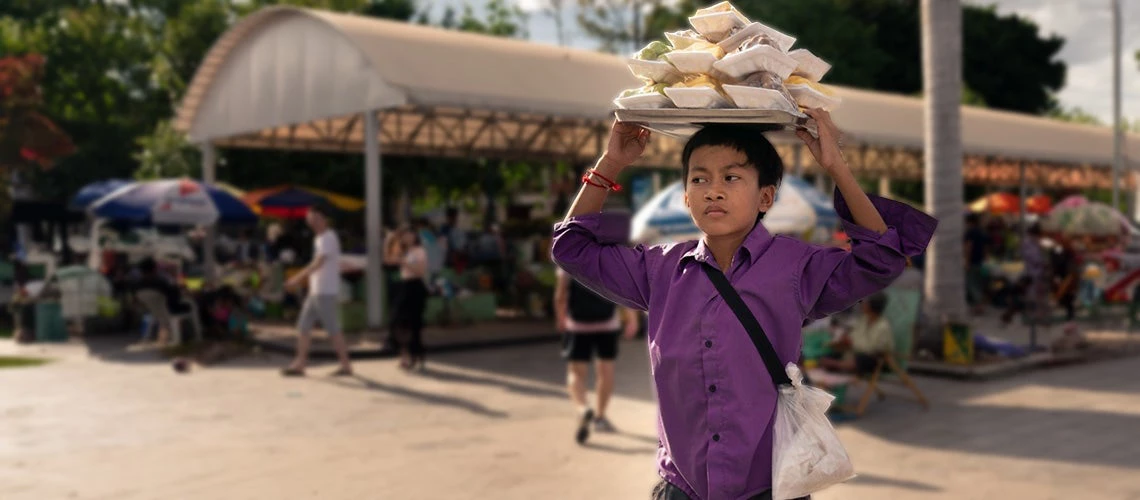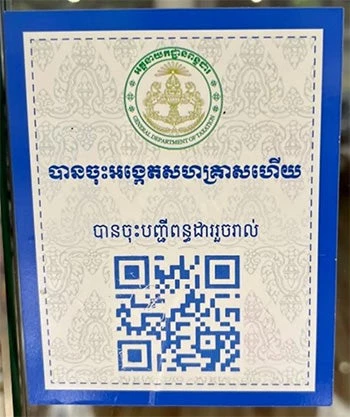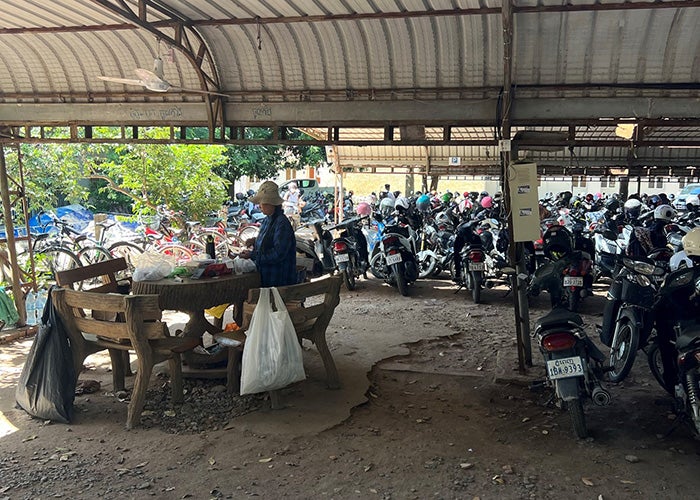 Young boy carries food containers on his head to be sold at a local market in Phnom Penh, Cambodia. | © shutterstock.com
Young boy carries food containers on his head to be sold at a local market in Phnom Penh, Cambodia. | © shutterstock.com
If you go on the streets in any developing economy, chances are you will run into a street vendor, a testament to the prevalence of a thriving informal sector. This vast and multifaceted domain poses a challenge for researchers and policymakers to understand this sector due to its lack of record of these businesses.
The Informal Sector Enterprise Surveys (ISES), which uses the Adaptive Cluster Sampling (ACS), provides a solution to studying the grey economy — namely to generate data on informal businesses and help researchers and policymakers alike to understand these businesses. Drawing from recent fieldwork experiences in Indonesia and Cambodia, we present five considerations for data collection in this dynamic sector.
1. What is business?
Is there a difference between a panhandler and someone playing an instrument waiting for tips, when it comes to defining an economic activity?
For ISES, much like in standard economics course, the definition of an economic activity is “an exchange”. Anything that engages in an economic activity, producing a good or providing a service, with more than one other party is considered a business. This definition has multiple implications:
- Street musicians provide entertainment to others in exchange for tips, and therefore they would be considered a business. Panhandlers provide no exchange (though one may argue effect of the warm-glow giving), so their activities would be excluded from the estimates.
- Workers that engage in activity with only one party would not be considered a business. Take the example that is very common across the world — domestic workers (ex: nannies, cleaning staff, etc.). If they are servicing only one household, they are considered as workers of the household. But if they service multiple households, then they are considered a business.
- Businesses can be operated by people of any age, including young children. While the social warriors in us may not want to consider this as a business because of child labor laws, this is still considered a business.
2. Who is considered informal?
Even in countries where the registration process is simple, defining informality is a complex subject. In most countries, if not all, to formalize, businesses must comply with several steps ranging from registering a business name, obtaining unique tax ID, to registering with labor and social security agencies, and the list goes on. Countries that have registration at different administrative levels only add complexity to the process. An additional complication are any exception rules which may apply to firm size or certain sectors.
Data collectors must decide at what point a business is considered formal or informal. Striking the right balance is essential, as being overly exhaustive can lead to confusion and resistance from respondents. The current approach aligns with the World Bank Enterprise Survey (which surveys the formal sector), where inclusion in one is an exclusion in the other, and vice-versa. This means that not all registered firms are fully formal, just as not all businesses that lack registration are fully informal.
3. Do not judge a book by its cover.
Businesses in Cambodia need to display a sticker with a QR code at their entrances, indicating that they are registered with the General Authority of Taxation of Cambodia. Photo credit: Filip Jolevski |
Stereotyping informal businesses can lead to biased estimates. In Indonesia, we encountered surprises, such as a boutique hotel with an expired registration and a street vendor with proper registration. Enumerators must avoid making assumptions and remain objective when categorizing businesses.
4. Remember, there can be countless types of businesses.
The informal sector encompasses a broad spectrum of business activities. Beyond the traditional street vendors and service providers, we discovered unconventional businesses like bike storage services, weight measurement rentals, high-end jewelry sales, among others. These unique activities meet market demands and provide income to those engaged in them, emphasizing the need to embrace diversity within the sector.
A business activity which keeps the motorbikes safe. Photo credit: Filip Jolevski
5. Complex enumeration—counting isn’t that simple.
Counting informal businesses is far from straightforward. Variations in the number of businesses counted can arise due to factors like enumerators’ understanding and personalities, location accuracy, and even business hours. Enumeration teams must be rigorously trained to understand how to implement surveys systematically.
Lessons learned
The informal sector, often referred to as the grey economy, encompasses a spectrum of legal business activities that operate beyond the purview of official authorities. Just as a single color can have numerous shades, the informal sector exhibits various gradations. Collecting data on this diverse and often overlooked segment requires careful consideration of the challenges and nuances involved. The World Bank's Informal Sector Enterprise Survey serves as a valuable tool for generating insights and knowledge, ultimately contributing to programs that support the success of these businesses. Understanding the various shades of the grey economy is a complex but necessary endeavor for researchers and policymakers alike.
- Enterprise Surveys homepage: https://www.enterprisesurveys.org/en/enterprisesurveys
- Informal sector survey: https://www.enterprisesurveys.org/en/informal-businesses/coverage





Join the Conversation